Pentecost Sunday. Our world certainly looks differently than last week, doesn't it?
Not only have 100,000+ lives been lost to Covid-19 but yet again another unarmed black man in Minnesota has died because a police officer had his knee on his neck.
If your social media feed is anything like mine, it's full of rage, anger, tears, disappointment and laments of "How long O, Lord?" THIS MUST STOP.
Then, this weekend, the streets in Chicago, Dallas, my home base in Washington, DC and beyond have filled with protesters. In Atlanta on Friday night, i watched protesters ignite a police car in flames.
And I could think of no better word on a week like this to offer than fire.
Cities and their citizens all across America are erupting in fire right now. What can we learn?
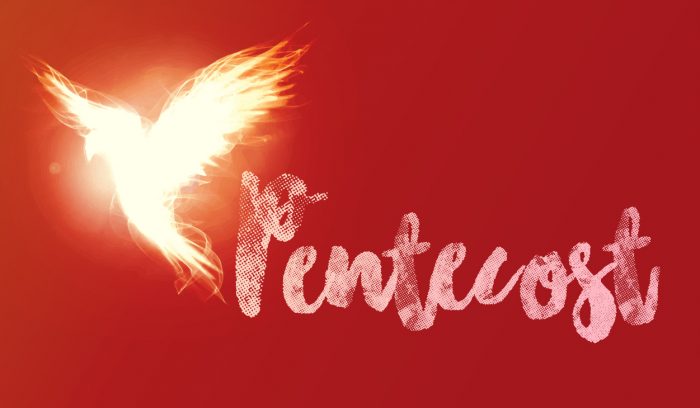 This Sunday, the text I'm preaching on at my church is all about fire. We're celebrating the birth of the church and the gift of the Spirit on the day of Pentecost-- the day when a fresh wind blew from heaven like fire.
This Sunday, the text I'm preaching on at my church is all about fire. We're celebrating the birth of the church and the gift of the Spirit on the day of Pentecost-- the day when a fresh wind blew from heaven like fire.
For when there is a fire: we all stop and take notice. You can't unsee it. You can't pretend it never happened. You smell it. You taste it. You hear it burn.
Fire electrifies. Fire projects. Fire eventually refines.
Ashes tell you that you must rebuild from a fire -- from the ground up.
A new foundation must be laid.
There is no going back to the old way after a fire.
And in this recollection, we've been given a call to rebuild after the fire.
Today, my white friends, we must begin again.
But "how?" so many of us are asking. "What can I do?"
These are questions I'd love for you to spend some time thinking about this week especially if you are white. And if you my white friends, need some help getting started, I'd love to suggest this resource or this one too.
May the fire of God's Spirit be upon you this week as you move and learn.
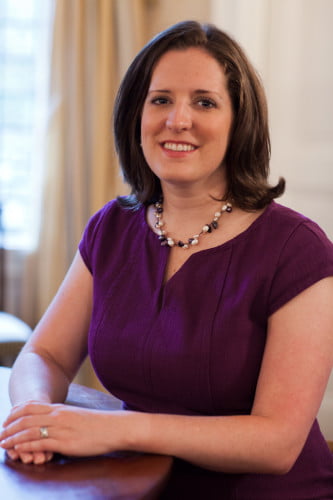 I am inspired by friends who dream big dreams and then have the perseverance to see them through.
I am inspired by friends who dream big dreams and then have the perseverance to see them through.
My friend, Rebekah is one of them!
Currently she lives out her calling at Brick Presbyterian Church in the city of New York as the Associate Minister of Christian Education and Discipleship.
Rebekah is also a wife to BJ (a Baptist pastor), a mom and 2006 Duke Divinity
School graduate (like me!) and can making wearing a hat on Easter look so classy!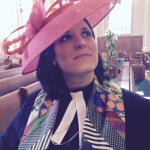
Growing up in a family with a mom as an educator in South Carolina, she found herself always surrounded by books and lessons about the power of words. Hearing stories about God and God's love for her grew her faith and later a call to ministry.
When she became an ordained pastor children's books of course became an important part of her work with young kids. And amongst her collection she noticed a gap: there were no books to teach children about the Day of Pentecost or otherwise known as the birthday of the church. Or, the day when the Holy Spirit came to earth.
Then, an idea came to her. What if she wrote something?
With encouragement from many who said she was the woman for the job, she started.
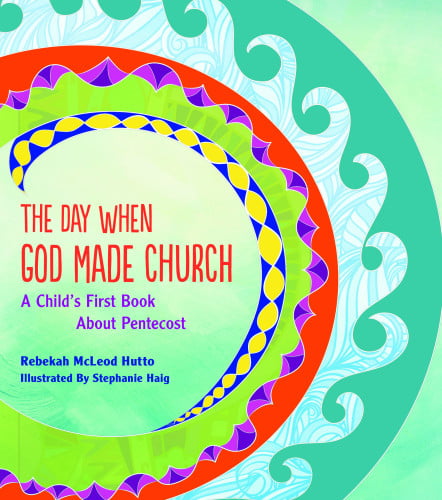
Rebekah even offered a guest post on Preacher on the Plaza about what it was like to pen this book in 2014 that you might remember.
Next all she needed was a publisher-- a partner to give her words a platform.
But as those of us who are immersed in the publishing world know getting from point A of writing a book to point B of publishing is no small task! Most publishing journeys are full of so many ups and downs, stops and starts and days when you want to pull your hair out! But, Rebekah did not waver. She believed in her idea that much!
And, the best news of all is that this spring Paraclete Press released The Day God Made Church to much acclaim of church leaders across denominations and traditions.
Rebekah's book is grounded in the mystery of God and the beauty of the church. And The Day God Made Church is beautifully illustrated by Stephanie Haig. I know you'll finish reading it and understand why this holiday is one to be celebrated with much fanfare!
I hope that you'll purchase a copy for the little ones in your life, your church's children's ministry or even to use for a children's sermon on Pentecost Sunday, May 15th!
Even her 8 month old son, Elijah is excited about it! So you should be too! 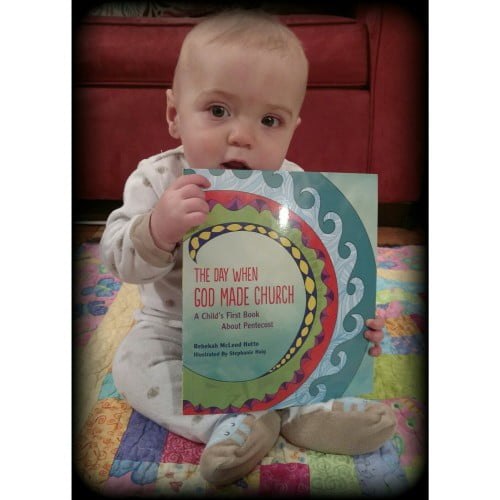
A Sermon Preached at Farmdale Baptist Church, Sylvania, GA from Acts 2:1-21 with Genesis 11:1-9
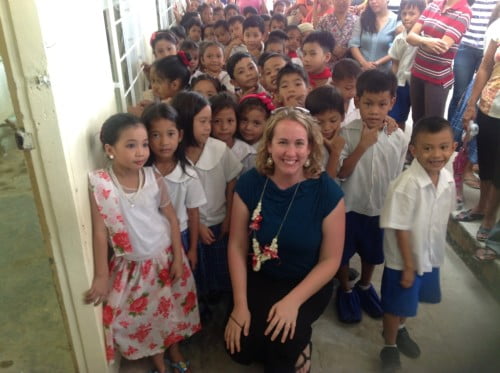 Have you ever been in a situation where not everyone spoke English? Where you found yourself unable to understand somebody?
Have you ever been in a situation where not everyone spoke English? Where you found yourself unable to understand somebody?
I have more times than I can count.
Over the past three years that Kevin has served as the President of Feed the Children, I think the story of our lives could be summed up in one word. Traveling. I think every time we call Kevin's parents or my parents the first question they ask us is, “Where in the world are you?” (And we often given them a different answer!)
On these trips, experiences no matter where we are in the world are similar. As we have approached a community in need where Feed the Children has a school or a water project or a health clinic, we’ve met with parents and kids. We’ve done what we can to encourage children, parents and staff. It’s all great. But then we’ve usually had this one BIG problem. We speak English. But others don’t.
So when we sit down for lunch, we often don’t know what we’re ordering on a menu (unless we get help). We don’t know what others are saying around the table (we just hope they’re saying something nice). And there have been moments when Kevin and I have found ourselves sitting at a big table full of folks, only talking to each other.
And in moments like this, we’ve relied on smiles, handshakes and hand motions--- all geared toward making a point the best we can with our body language. We’ve hoped to not embarss ourselves too much.
But it is frustrating nonetheless. I can’t tell you how many times I’ve said to myself: “I wish I knew Spanish. I wish I knew Swahli. I wish I spoke French.”
And though Kevin learned a lot of German in high school it’s never really helped him much out where we’ve visited.
What we just read from Genesis is an experience of completely different proportions than what I just described to you about our traveling. Those gathered on the earth at this time had never experienced such a problem. They all spoke the same language. They gathered together as one. Could you imagine how lovely that was?
But scripture tells us that those gathered became a little too confident in their unified powers. They believed that “they could make a name for themselves” by building a tower high in the sky with bricks and mortar. They wanted to be the ones completely in control of what came next, not God.
From what we know of God, we can imagine how well this went over . . .
In response, the Lord says, “Come, let us go down and confuse their language so they will not understand each other.”
You see, God said such pride would not do. Their punishment became separation from their human brothers and sisters. No longer would everyone speak the same language. No longer would the whole earth feel like a great big ole family.
So what came next was: folks began separating themselves, scripture tells us, by language.
Colors and skin tones began to divide from one person from another person.
“Where are you from?” became a question folks asked each other.
The world became full of not only different languages, but also different tones of voice and accents that continues to this day.
Ever gone to Mississippi or Boston or Pennsylvania and have a problem understanding what they’re saying?
I have to say that since joining the Hagan family and spending lots of time in South Georgia there are new words and ways of talking about things that I’ve had to learn. I can remember on one of my first visits here when Kevin and I were dating, Rachel (my mother-in-law) asked me what I wanted for dinner. I wonder why she was so concerned about dinner at 11 am in the morning. But later I got the translation dinner = lunch (as I understood it). Oh, it all became clear!
This one small example shows that even if our official language is English, there are still a thousand ways we can say the same things. It’s so easy for us to not understand one another.
But was this the way that God intended for us to live—not understanding each other and all speaking different languages?
I don’t think it was.
Only a few short weeks ago it was Easter. It was day we celebrated the message of NEWNESS that Christ brings.
Isn’t the message of Easter that we ALL can be included in God’s family? Isn’t the message of Easter that ALL are welcomed? Isn’t the message of Easter that in Christ we are ALL made new through Jesus Christ our Savior and Lord?
So if all of this is true, then, Easter, would give us a WHOLE new way of speaking to one another, right? The separation that the Tower of Babel brought us would be no more!
Our New Testament lesson from Acts 2 has a lot to change the tone of the story in wake of all that Easter meant for the world.
And as we just heard read, the day started out pretty normal other than the fact it was a festival on the Jewish calendar and everyone was gathered in Jerusalem for worship and celebration.
It meant the disciples of Jesus, in particular were all together. They were still trying to figure out what to do with their lives, what would be the next steps for them in this post Jesus world. But then, verse 2 of Acts 2 tells us that, “Suddenly a sound like the blowing of violent wind came from heaven and filled the whole house where they were sitting.”
What could this sound be?
I could imagine the disciples were frightened. For: “They saw what seemed to be tongues of fire that separated and came to rest on each of them.”
And though we in the church world can easily get caught up in verses like this when we hear that the disciples: “began to speak in other tongues (or languages) as the Spirit enabled them” wondering, “What is tongues?”
The truth is this: the Spirit came and those who received the Spirit understood one another in ways they’d never had before. Suddenly, you see, it became a world where LANGUAGE was no longer a divider-- there was a a way to understood one another!
Through the Spirit people heard one another in ways in which they never had before!
About two years ago, Kevin and I made our first trip to Guatemala with Feed the Children. It was a beautiful country and we loved the all the kids we met. But, as the week came to an end, I was notably aware of the language divide. The official language in Guatemala is Spanish. But not everyone in Guatemala speaks Spanish. And few speak English especially in rural areas where we work.
Many of the communities that we visited were full of residents of Mayan decent (many of whom live on less than $1 US dollar day, by the way and have not completed a grade school education). Thus, at each stop of our trip, the mothers and children spoke a different dialect of a tribal language. Not even the Guatemalan staff could understand what the mothers said.
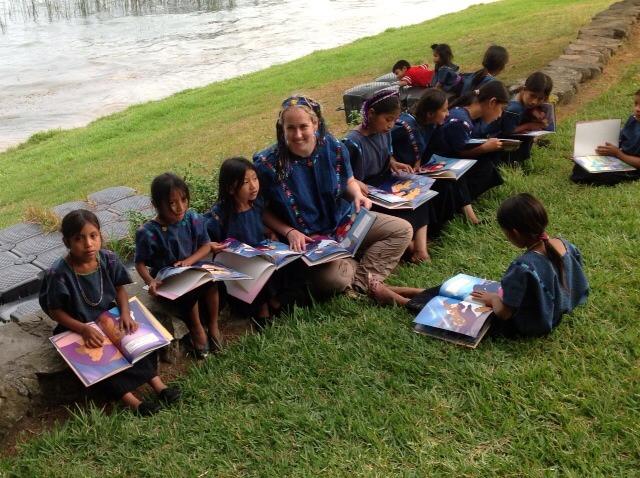 Together we relied on the Mayan children who’d learned Spanish in school to translate their tribal language into Spanish. Then the Feed the Children staff that spoke Spanish and English translated for Kevin and I. While it was good to be among these beautiful and hospitable people, the communication was exhausting. Double translation as you might imagine took a lot of time to just get a simple question answered like, "Where does your family live?"
Together we relied on the Mayan children who’d learned Spanish in school to translate their tribal language into Spanish. Then the Feed the Children staff that spoke Spanish and English translated for Kevin and I. While it was good to be among these beautiful and hospitable people, the communication was exhausting. Double translation as you might imagine took a lot of time to just get a simple question answered like, "Where does your family live?"
But, when it came time to say goodbye at the airport to the directors of the program, non-English speakers themselves, but leaders full of kind hearts and deep love for the children of their nation, I found tears rolling down my cheeks.
Though we’d never spoken directly from native language to native language, I knew these the hearts of these two. I knew they loved God and sought to serve the Lord in all they did. They loved and appreciated me and wanted me to know how happy they were to have my visit to their country. I felt the same about them.
Together we stood on holy ground.
And the frustrations of communication that we’d experienced that week seemed to pale in comparison to the hugs we exchanged and the smiles that beamed across all our faces. It has been good to be together in partnership and we all knew it. God had done a work among us—a work that was changing and is changing children’s lives in Guatemala forever!
Such was a moment of the Spirit transcending, resting upon us, and intercessing for us if I’ve ever experienced one.
For while my friends did not suddenly understand English and I did not suddenly understand Spanish, something about our hearts connected in ways that could have only come from God. Something opened that had been previously closed before.
It was a place for me, like the day of Pentecost was for those first disciples where heaven and earth met.
And this, my friends, is what it means to be Easter people who live by the spirit. Together, with Jesus’ help, we are creating a new world where we don’t have to be so separate from other people-- especially people who seem so different from us on the outset.
This new world is a world where the words I speak do not keep me from you, but can join us together . . .
A world where it matters not where you and I came from, but only how open we are to the future God has in store for us . . .
A world where the color of my skin does not make me better than or less than, but merely a beautiful part of God’s brilliant mosaic of lots of colors . . .
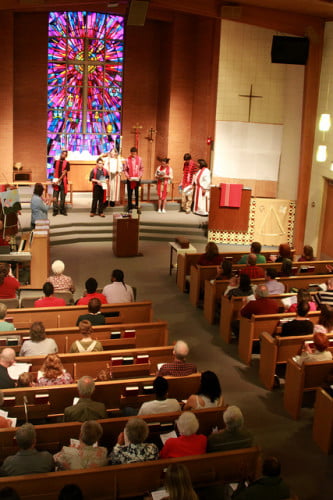 Many people called the day of Pentecost the birthday of the church. Or in some churches a good excuse to have a cake and sing happy birthday after worship . . . I like the idea of making a big fuss about a day like today because our birthday is all about this: in the church, we are a different kind of people. We’re not like a flower club or a Rotary meeting or a mom’s play group.
Many people called the day of Pentecost the birthday of the church. Or in some churches a good excuse to have a cake and sing happy birthday after worship . . . I like the idea of making a big fuss about a day like today because our birthday is all about this: in the church, we are a different kind of people. We’re not like a flower club or a Rotary meeting or a mom’s play group.
We’re the church because of the Spirit of God has gathered us and lives in us, and helps us. And this changes EVERYTHING about our coming together.
I want to ask you this: when is the last time you sat in a deacon’s meeting or Sunday School class and thought to yourself, how in the world do I go to church with these people? These people.
I bet all of us could relate.
Church, at least how Jesus taught us to do it, is a crazy thing.
People of all kinds of backgrounds and cultures and ages and opinions and education levels and life experiences can gather with one goal. The Spirit keeps us together, even with there are a thousand reasons to tear us a part or to split.
And if you’ve been around church for any length of time, you know what I mean.
Just because we are Christians, it doesn't mean that we are always going to agree.
We’re going to go through seasons when we don’t get along.
We are going to even fight with our words from time to time (and hopefully not with our hands!)
We may want to walk away from church business meetings sometimes and throw up our hands and say, “What’s the point?”
But because we have the gift of the Spirit, all is new. We don’t have to fight or disagree like the world does. We don’t have to be segregated like the world thinks we should. We don’t even have to look like the world thinks we should.
Lauren F. Winner, one of my professors and classmates from seminary said this, “The Spirit is the reason we can build a church and have confidence that we will get it at least a little bit right.”
Because of the Spirit, you see, we can imagine a new world. We can imagine a new community. We can imagine worship in this place going on for generations to come.
Today is the day of new winds of the Spirit. Today is the day of imagining a world where we are all not only welcome at God’s table, but heard and understood.
God has good things and a bright future in store for this church—if only we keep listening to the Spirit of God.
AMEN
Today marks the final installment of my summer blog series on Pentecost with a fabulous word from my seminary classmate and friend, Dana .Dana has a powerful story to tell and I'm glad to have her words to share with you here. If you've missed any of these posts, might I suggest catching up before you start with this post one explaining the series.
 The Turning Point: How the Spirit Changes Everything
The Turning Point: How the Spirit Changes Everything
I was baptized on Pentecost by an ordained woman serving south of the Mason-Dixon line, a miracle for Baptist churches of the 1990s. At that time, only the most progressive worshiping communities were hiring female ministers to serve in a capacity other than serving as Christian educators.
That Pentecost morning, I was born into the Christian community with water and Spirit. But my baptism sparked a chain of events that would, ultimately, reach beyond the membership of Christ’s Church. It would lead to my early Christian formation, my decision to attend seminary, my ordination—and—an extraordinary turning point—my marrying outside the Christian faith.
Pentecost: A Promise Comes to Life
Pentecost marks a liturgical season in which the Christian Church celebrates exactly how she became Church: through the work of the Holy Spirit, received by the apostles and other followers of Christ in Acts 2.
At the ascension, Jesus told his disciples that “John baptized with water, but you will be baptized with the Holy Spirit” (Acts 1:5, NRSV).
Jesus’ promise manifested days later, when the followers of Christ were gathered for Shavuot the Jewish Feast of Weeks that commemorates the law given at Mount Sinai. Scripture tells us that “tongues of fire” rested on them, offering the power of God through the Holy Spirit.
It was their turning point.
The Fruit of the Spirit
Later, in Paul’s letter to the Galatians, we learn more about what this “turning point” brought to the Christ-followers: the empowerment to share Jesus’ birth, life, ministry, death, and resurrection to all whom they met. We know that the power of this Spirit spread, and it bore the fruit of love, joy, peace, patience, kindness, generosity, faithfulness, gentleness, and self-control (Galatians 5:22-26).
But Paul cautioned the early fledgling church: “if we live by the Spirit, let us also be guided by the Spirit” (Galatians 5:25).
Then and now, this means fostering a posture of love and humility.
But that is not how many people would describe the trajectory of the modern Christian Church.
As Christian minister married to a devout Hindu, I’ve seen first-hand the hatred Christians can spew toward non-Christians. And, that is not the work of the Spirit that was so graciously bestowed upon us in Jesus’ absence.
When we concede that we know all there is to know about God, sacred texts, and how religion should be run, we’ve neglected our Pentecost roots. We’re forgetting the “turning point” in which the Church was birthed. The Spirit was not given to us to spread dogma and draw lines between who’s in and who’s out. The Spirit was given to unite us.
Perhaps the “turning point” we need in 2014 is to re-visit Acts 2 and remember the “awe that came upon everyone” that day. It was a day of unity, not division.
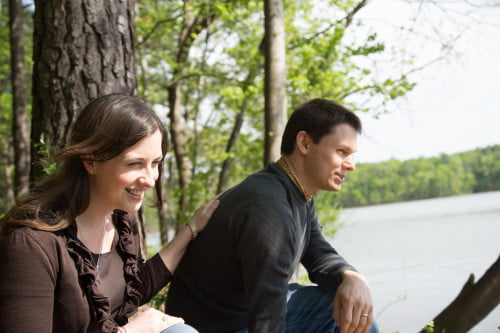 One Spirit: Interfaith Marriage
One Spirit: Interfaith Marriage
Since marrying Fred, I find myself advocating for how the Spirit unites us across religious and non-religious boundaries. I believe in a God who is Creator of us all—not an exclusive God who loves and listens to a chosen few.
But, we often take the initial reaction the onlookers had at Pentecost. We assert that those who are eager to unite are actually “drunk” with ignorance. We have difficulty conceiving that there are mysterious forces that unites us, not divide us.
While my mixed-faith marriage challenges everything I’ve known to be “true,” living with a Hindu helps me see the unifying Spirit at work. Our willingness to learn more about one another’s spiritual journeys is how we reach the pivot: when we look closer, we discover connections we never dreamed possible. And that is our turning point.
J. Dana Trent is an ordained Baptist minister and the author of Saffron Cross: The Unlikely Story of How a Christian Minister Married a Hindu Monk. When she’s not procrastinating with episodes of “The Young and the Restless,” Dana blogs at jdanatrent.com and tweets @jdanatrent.
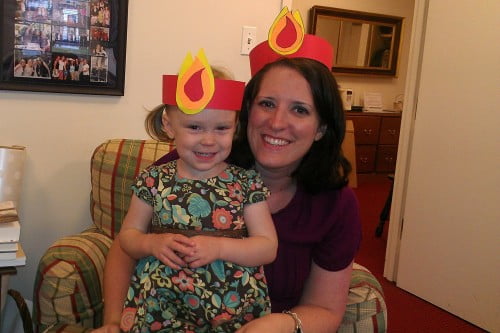 Today, as our summer Thursdays "Pentecost Possibilities" series continues, I'm glad to introduce my friend and colleague, Rebekah Hutto to the blog. She's a mother of Hannah Ruth as pictured to the left. Rebekah has allowed the Spirit to lead her to combine two of her favorite things-- children's books and the season of Pentecost into a writing project. I'm so glad to share her story with you here:
Today, as our summer Thursdays "Pentecost Possibilities" series continues, I'm glad to introduce my friend and colleague, Rebekah Hutto to the blog. She's a mother of Hannah Ruth as pictured to the left. Rebekah has allowed the Spirit to lead her to combine two of her favorite things-- children's books and the season of Pentecost into a writing project. I'm so glad to share her story with you here:
I’ve always been drawn to the illustrations and poetic words.
My mother, an early childhood educator, celebrated every important moment in my life with a different children’s book.
My office library is filled with as many, or maybe even more, children’s books as books on theology, church history, and the Bible. I use these books in teaching, preaching, and Bible study—children and adults alike are drawn to their images and rhythmic words.
As an ordained pastor, I have collected children’s books from many of the major Biblical stories: creation, Noah’s Ark, Moses, Jonah, and Jesus’ birth. But my favorite Bible story, the day of Pentecost, has been absent from the shelves. There are countless books on the life and ministry of Jesus, but children’s authors have often left out the ministry he gave to us in the Church.
The only places I’ve ever found the story of Pentecost for children have been in children’s Bibles. No one has really attempted to communicate this story to children through a picture book. And that’s a shame.
Maybe it’s because I love the color red and my red stoles are some of my favorite to wear. Or maybe it’s because I wish the Church was always as exciting, noisy, and unpredictable as in those first days following Pentecost.
I’m afraid that many of our mainline churches have lost this Spirit of creativity and have become fearful of the Holy Spirit’s often chaotic ways—chaos that our children often embrace.
We like things the way they’ve (allegedly) always been and hold to our traditions rather than the new thing God may be doing among us.
So I wrote a version for younger children, pleaded with publishers for a couple of years, and then finally signed a contract to publish it in 2015. I wrote this story because there are many aspects of it that make it exciting and full of drama.
The words convey anticipation, a hopeful waiting among crowds of people. Because this is the story of the Church’s birthday, it invites parties and celebrations. It also celebrates the third member of the Trinity, the Holy Spirit, and I want children to learn that the Spirit calls all of us, even the youngest among us.
Most importantly, in a world where cultures and people often clash, I want children to know about the multiculturalism and diversity of Pentecost.
One of my own issues with children’s literature is that too many of the faces are white, inadvertently teaching children that the Church is made up of a homogenous group of Caucasian people.
I was inspired to write the story of Pentecost to remind children that not only did God create a world filled with diversity, but also God’s Church should reflect creation’s diverse people—their talents, races, and languages. Because our churches do not always reflect this, when children learn about the diversity of Pentecost, they can begin to ask why their own congregations aren’t so diverse.
Maybe I’m an idealist, and this book and this story won’t shape children like I hope. But in my own childlike way, I dream of a church that is as exciting and Spirit driven as the one in the first days—and I think our children can show us this truth. After all, Peter preached, quoting from Joel, that men and women, young and old are called to prophesy, dream, and envision God’s Kingdom. I hope this book, and others that follow, can encourage our children to do the same.
Rev. Rebekah McLeod Hutto is a minister in the Presbyterian Church, USA. She currently serves as the Associate Minister of Christian Education and Discipleship at Brick Presbyterian Church in the city of New York. Her children's book "The Day When God Made Church" is being published by Paraclete Press and due out early in 2015.
Today, I'm glad to share the words of a fellow member of the RevGalBlog, Amy Hanson a ELCA (Lutheran) seminarian. She allowed me to repost this part of her Pentecost sermon from 2013 posted originally on her blog, Diary of a Contemplative. Amy suggests that when the Spirit comes it is not as much about the institutional church . . .
I think that we all sometimes operate under the mistaken assumption that when the Holy Spirit enters into our lives and starts remaking us, it is going to feel good.
The Holy Spirit not only forms and reforms us as a church, it also forms and reforms us as individuals. I am not sure where we get the idea that the Holy Spirit is a gentle dove that is guiding our way, because the Holy Spirit that we hear about in today’s reading is downright terrifying.
Flames and noise and confusion.
But this Spirit…she speaks truth. The truth is often painful to hear and might not be what we want.
Just as the Holy Spirit gathers together an improbable collection of people in today’s text to form the body of Christ, she continues to do so even today.
What if Pentecost is less about the establishment of the institutional church and more about being broken open and baptized by a fire of truth over and over again?
. . . I want to share a story with you about how I experienced the Holy Spirit this week. In the heartbreakingly truthful way that she often works upon us. I spent most of last Monday at the capital building as we awaited the results of the vote for marriage equality in our state.
I was with friends, surrounded by at least a thousand others chanting and singing. You could feel the spirit move as we implored our senators to “be on the right side of history” and “make the right choice” and generally we all got caught up in the joy and excitement.
I went outside to get some fresh air and that is where the Holy Spirit really got me.
In the midst of a sea of orange t-shirts and rainbow flags was a lone middle-aged man wearing a polo shirt and khakis sitting on the steps holding a pink “Vote No” sign. It was clear that he was fearful and uncomfortable.
I really wanted to dislike this guy because he was invested in the idea that people like me and so many of those whom I love should not be allowed to marry. Instead of hatred, I only felt compassion.
This man was trying to be faithful in the best way that he knew how, just as I was attempting to do the same thing. And believe me, I am not a good enough person to pull this off on my own. The Holy Spirit is behind this one. It would have felt good to be angry with this guy, even to hate him, and instead, my eyes met his and I felt my heart-break. Even though I didn’t want to claim this guy as a fellow worker in the Kingdom of God, an integral part of the Body of Christ, he’s most certainly a part of it, and it’s not my job to decide whether he is in or out and not something I can do on my own. THIS is what the Holy Spirit will do to you.
This very Spirit is God coming into the world and smashing apart every human judgment and every disagreement and every possible flimsy construction we have for understanding who God is.
The church that was created on Pentecost is not a building and not a denomination and not a place you go on Sundays, but a body of wildly diverse people who are continually being made and remade in the image of God. And we need each other. That is what we celebrate with Pentecost.
 My favorite Sunday of the year is hands down: Pentecost. I loved having a chance to preach it this year at this church.
My favorite Sunday of the year is hands down: Pentecost. I loved having a chance to preach it this year at this church.
Who doesn't love an excuse to wear red, adorn the church with colorful banners and have a birthday cake at coffee hour after worship? And personally, I love having an excuse to buy Pentecost shoes (an annual tradition).
But then it's one day. And, it's over. We pack away all the red till next year.
And in the same way, it seems that our "Spirit-filled" language seems to cease too.
(Unless we are Christians who are members of a Pentecostal denomination such as the Assemblies of God, Four Square or a non-denominational congregation).
Especially in the mainline church, where I spend most of my time, we don't talk about the Holy Spirit all too often.
Maybe we think we're too busy with other things? Maybe because we believe one Sunday does it all? Or maybe we're just afraid.
If I got to vote, I'd say the mainline church is afraid. We're because the Spirit is not something we can control or put into a pre-planned and printed order of worship. We're afraid of the label "Pentecostals." We want our worship to be respectable, intellectual, and in the pews with appropriate space from our neighbors.
But, might there be another possibility, even for us "frozen chosen" or "back row Baptists" or "contemplative types?"
This past Sunday at the church I've been attending in Oklahoma City, we had Pentecost day round 2.
It was a bit strange at first. After checking out the bulletin as the prelude played, I leaned over to Kevin and commented, "Don't they know that Pentecost was 2 Sundays ago?" Maybe they just forgot?
As the service continued, we heard the same scripture from earlier in the month (Acts 2). We sang Spirit acknowledging hymns. The preacher preached with a red stole around his neck.
But there was point. As the proclaimer started his remarks, he started with this claim. We are all Pentecostal people.
Like those gathered in Jerusalem on that first Pentecostal day, for us as followers of Jesus, it doesn't matter our country of origin. It doesn't matter our language. We can understand each another because of the Spirit's presence among us.
The proclaimer said, the diversity of those in the congregation that first Pentecostal day was the message. The kingdom of God would always be lived out in community. The kingdom of God would always be lived out with different colors, accents and ways of worshiping present. We need not be afraid of the word Pentecost. For if we are followers of Jesus, we are all Pentecostal people.
Pentecost was not a day but a way of life.
So, in the spirit of this exhortation and something that has been on my mind for a while, I'm happy to announce that for the next several Thursdays, Preacher on the Plaza will be hosting a group of diverse guest bloggers.
They'll be musing about: what does it mean to walk in the Spirit today? How have they come to see themselves as Pentecostal people?
All of this comes with the hope that this summer will be a time for new dreams, new visions, new words to describe our collective journey of faith. That though the church we worship in might be Baptist, Catholic or Reformed, we'd be ok with acknowledging our shared Pentecostal faith.
Joining the conversation next Thursday will be the fabulous, Rev. Abby Thornton Hailey and her experience of preaching Pentecost in another culture other than her own. Stay tuned.
Here's to hoping your weekend is full of Pentecostal possibilities!
(If you'd love to join in this series with a blog to share, contact me. I'd be glad to include your voice too!)
“Imaging a New World” Sermon Preached at Riverdale Presbyterian Church, Hyattsville, MD
Acts 2:1-21 with Genesis 11:1-9
Can you remember the last time or anytime you were in an environment where you spoke a different language than everyone else?
It could have been on an international trip either to the US for the first time or abroad, even something as simple as getting someone to clean your house or mow your lawn who originated from another place.
What did it feel like? What did you wish for? What do you still remember about such a time?
Over the past two years that my husband, Kevin has served as the President of an international relief and development organization called Feed the Children—a non-profit working in all 50 US states and in 10 countries around the world, we’ve done a lot of traveling. I mean A LOT of traveling! We’ve visited education programs and dedicated new feeding centers and built relationships with new friends all over the world. We’ve become the outsiders in communities.
The experiences no matter where we are in the world are similar. As we approach a community in need where Feed the Children has a school or a water project or a health clinic and begin to meet with parents and kids, it is a paralyzing feeling. Most of them, English is not spoken at all. And as for me, I can’t communicate beyond the basics of “Hello” “Good Morning” or “Nice to meet you” in the language of the community (if that!).
Not only this, but later when we sit down for lunch, I don’t know what I’m ordering on a menu. I don’t know what others are saying around the table. I don’t know how to tell new friends that I’m so impressed with the strides they’re making to help all the kids have brighter futures.
I rely on smiles, handshakes and hand motions--- all geared toward making a point the best I can with my body language. I hope that this finds a way to communicate love somehow.
I do the best I can. But it is frustrating nonetheless. I wish I knew Spanish. I wish I knew Swahili. I wish I spoke French.
As we begin to study our Old Testament lesson this morning, we read an experience of completely different proportions. Those gathered on the earth at this time had never experienced such a problem. They all spoke the same language. They gathered together as one.
It was a glorious time in human history. Translators were never needed. Everyone got along so well.
But the problem came when those gathered became a little too confident in their unified powers. They believed, Genesis 11 tells us that “they could make a name for themselves” by building a tower high in the sky with bricks and mortar. They wanted to be the ones completely in control of what came next, not God.
From what we know of God, we can imagine how well this went over . . .
In response, the Lord says, “Come, let us go down and confuse their language so they will not understand each other.” You see, God said such hubris would not do. Their punishment became separation from their human brothers and sisters. No longer would everyone speak the same language.
Folks began migrating, scripture tells us, from this moment on in groups of those who spoke their same language. Colors and skin tones began to divide from one person from another person. “Where are you from?” became an identifier making one person different from another. The world became full of not only different languages, but also different tones of voice and accents that continue to this day.
Ever gone to Mississippi or Boston or even Detroit and have a problem understanding what they’re saying?
Two weeks ago, for Memorial Day I visited my in-laws in South Georgia and was asked at 11:30 am to come to the dinner table and had no idea what was going on. Wasn’t it the middle of the day? South Georgia translation: dinner = lunch. Even if our official language is English, there are still a thousand ways that we can be DIVIDED in speech from one another.
But was this the way that God intended for us to live? Was the Tower of Babel and all that went down there the end of the story of language and how we live together in community?
It wasn’t. And to begin to understand God’s vision for our world, even as human pride sought to destroy every good thing that God intended, we must go to Easter—that liturgical season we just ended last Sunday with the celebration of the Ascension.
For it was on Easter, the day of resurrection, that Jesus, yes, Jesus ended his journey on earth with complete hope. No longer did division have to be the final word. When the women at the tomb heard from the angel that “Jesus was risen just as he said” it was a NEW day on earth. All were now welcome into God’s family, not just those who followed the practices of the Jewish faith.
This was the earth shattering truth: Christ is risen (Christ is risen indeed).
But with any MAJOR life changing revelation, it needed fleshing out. It needed time to settle into human hearts and minds. It needed a season or what we call the church, Eastertide—50 days from then until now.
And this now is our reading from Acts 2.
The day started out pretty normally other than the fact it was a festival on the Jewish calendar and everyone was gathered in Jerusalem for worship and celebration. The disciples of Jesus, in particular were all together. They were still trying to figure out what to do with their lives, what would be the next steps for them in this post Jesus world. But then, verse 2 of Acts 2 tells us that, “Suddenly a sound like the blowing of violent wind came from heaven and filled the whole house where they were sitting.”
What could it be???
I could imagine that the abruptness of this interruption was frightening.
But even more what could be named, qualified or even described, the Spirit of God was on the move and the world would never be the same.
Scripture even has a hard time describing it using vague language like, “They saw what seemed to be tongues of fire that separated and came to rest on each of them.”
As the people gathered tried to describe what was going on were their actual tongues? Was there really fire? Probably not, but the author of the book of Acts knew only dramatic image would do because of what came next. Verse four tells that that all of them, “began to speak in other tongues (or languages) as the Spirit enabled them.”
And though we in the church world can easily get caught up in verses like this wondering, “What is tongues?” “Does this mean we are to speak in tongues?” “Are those believers in Jesus who say they’re speaking in tongues today more holy than the rest of us?” (All of these questions are best saved for a Church History class).
What is truth is this—the Spirit came and those who received the Spirit understood one another in ways they’d never had before. Suddenly, you see, it became a world where LANGUAGE was no longer a divider.
Through the Spirit people heard one another in ways in which they NEVER had before!
About a year ago, I journeyed to Guatemala alongside the Feed the Children staff from the home office based out of Oklahoma. It was my first visit to this country and I was eager to see the beauty of the place I’d only read about in textbooks years before!
As the week came to an end, I was notably aware of the language divide. Many of the rural communities that we visited were full of residents of Mayan decent (many of whom live on less than $1 US dollar day, by the way and have not completed a grade school education). Thus, at each stop, the mothers and children spoke a different dialect of a tribal language unique to their Mayan heritage.
The Spanish-speaking Guatemalan staff did not even understand what was going on! Together we relied on the Mayan children who’d learned Spanish in school to translate their tribal language into Spanish. Then the Feed the Children staff that spoke Spanish and English translated for Kevin and I. While it was good to be among these beautiful and hospitable people, the communication was exhausting. Double translation as you might imagine took a lot of time.
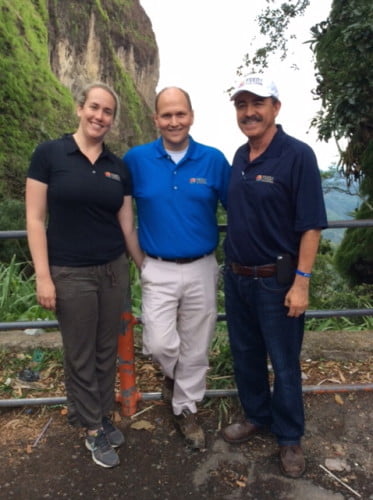 But, when it came time to say goodbye at the airport to the directors of the program, Altagracia and Ricardo, non-English speakers themselves, but leaders full of kind hearts and deep love for the children of their nation, I found tears rolling down my cheeks. Though we’d never spoken directly from native language to native language, I knew these the hearts of these two. I knew they loved God and sought to serve the Lord in all they did. They loved and appreciated me and wanted me to know how happy they were to have my visit to their country. I felt the same about them.
But, when it came time to say goodbye at the airport to the directors of the program, Altagracia and Ricardo, non-English speakers themselves, but leaders full of kind hearts and deep love for the children of their nation, I found tears rolling down my cheeks. Though we’d never spoken directly from native language to native language, I knew these the hearts of these two. I knew they loved God and sought to serve the Lord in all they did. They loved and appreciated me and wanted me to know how happy they were to have my visit to their country. I felt the same about them.
Together we stood on holy ground.
And the frustrations of communication that we’d experienced over the last seven days seemed to pale in comparison to the hugs we exchanged and the smiles that beamed across all our faces. It has been good to be together in partnership and we all knew it. God had done a work among us—a work that was changing and is changing children’s lives in Guatemala forever!
Such was a moment of the Spirit transcending, resting upon us, and interceding for us if I’ve ever experienced one.
For while my friends did not suddenly understand English and I did not suddenly understand Spanish, something about our hearts connected in ways that could have only come from God. Something opened that had been previously closed before.
Biblical Scholar N.T. Wright has said: “Those in whom the Spirit comes to live are God's new Temple. They are, individually and corporately, places where heaven and earth meet.”
Or, as I like to think about it, on the day of Pentecost a new world comes to be. Heaven really does come to earth!
A world where the words I speak do not keep me from my neighbor, but can join us together. . . .
A world where it matters not where I came from, but only where I am willing to journey in the future . . .
A world where the color of my skin does not make me better than or less than, but merely a beautiful part of God’s brilliant mosaic . . .
They call this day in the liturgical calendar we follow, the birthday of the church. Or in some churches a good excuse to have a cake at coffee hour after worship . . .
It’s the birthday of the church because with the giving of the Spirit, all of us were given the tools we need to make our community life together possible. You see, in Jesus, we are given the purpose. Remember the message of Easter. Christ is risen (Christ is risen indeed). But with the Spirit, we are given the means to share the message.
I want to ask you this: when is the last time you sat in a church committee meeting or a Bible study and thought to yourself, how in the world do I go to church with these people?
I bet all of us could relate.
Church, in our modern expression is a crazy thing. People of all kinds of backgrounds and cultures and ages and opinions and education levels and life experiences and on and on gather because we love Jesus and want to follow Him, but in actuality, living it out can be one the hardest thing that we’ve ever tried to do.
And if you’ve been around church for any length of time, you know what I mean. We naturally are going to disagree. We’re going to go through seasons when we don’t get along. We are going to even fight with our words from time to time (and hopefully not with our hands!)
We may want to walk away from church sessions and throw up our hands and say, “What’s the point?”
But, today we remember the gift of the Spirit. We remember the great tool God gave us in the Spirit. We remember that the Spirit is what enables us to come together as one, as Jesus prayed that we would be.
Lauren F. Winner, one of my professors from Duke Divinity School and author of God Meets Girl writes, “The Spirit is the reason we can build a church and have confidence that we will get it at least a little bit right.”
Because of the Spirit, you see, we can imagine a new world. We can imagine a new community. We can re-imagine this community and the next chapter that God has in store for it in all its potential.
We don’t have to let our language divide hold us back—whether that be actual spoken languages as God brings non-English speakers to our front doors. Or when God brings us folks who hail from different parts of our country with strange ways of doing things or even when the different “languages” of our hearts seek to divide us.
For today is the day of Pentecost. Today is the day of new winds of the Spirit. Today is the day of the color red—the color of the refining fire. Today is the day of imagining a world where we are all not only welcome at God’s table, but heard and understood.
AMEN